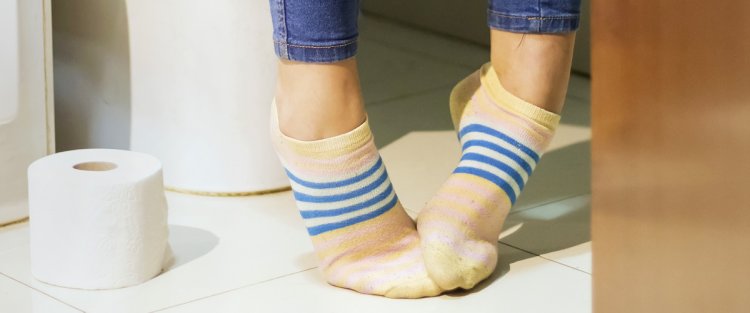Your Urinary Health: What You Should Know
The do’s and don’ts when it comes to peeing.

We’ve all been there: You’re out running errands or on the road and you have to pee. Instead of hunting down a restroom or pulling over, you decide to hold it. It might sound harmless enough, but over time, “holding it” could impact your urinary health more than you think.
According to Dr. Doreen Chung, urologist and an expert in male and female urinary incontinence at NewYork-Presbyterian/Columbia University Irving Medical Center, you should never hold in your pee if you can help it. She adds that urinary troubles like stress urinary incontinence (the involuntary leakage of urine with coughing, sneezing, or physical exertion) or an overactive bladder (urinary urgency, frequency with or without incontinence) are quite common.

Dr. Doreen Chung
“People don’t talk about it much, so they often feel like they’re the only person who is dealing with these kinds of issues, but they are actually super common and simple to address,” she says.
Health Matters spoke with Dr. Chung, who is also an associate professor of urology at Columbia University Vagelos College of Physicians and Surgeons, about why it’s not advised to hold in your pee, how often you should be urinating, and other useful tips when it comes to taking care of your urinary health.
Here are five things to keep in mind:
1. Don’t hold it in.
Holding in your urine for long periods of time makes it difficult to relax your pelvic floor muscles, the muscles that you contract to help keep you dry. Doing this every once in a while is no big deal, but over time, it can make it harder to fully empty your bladder. Consistently holding in your urine and never fully emptying your bladder make you more prone to urinary tract infections (UTIs). It may also make you more prone to pelvic floor dysfunction and pelvic pain.
Dr. Chung advises not to hold in bowel movements either. “Bowel function can also affect bladder function,” she says. Severe constipation can make it harder to empty the bladder. Also, the bacteria that cause UTIs come from the stool. “The longer the stool sits there, the higher the likelihood it can climb into the bladder.”
2. Relax (and don’t hover).
Some people choose to hover over the toilet seat — especially when using public toilets. But hovering keeps your pelvic floor muscles engaged. Dr. Chung urges us all to sit down and relax the muscles. “The bladder is supposed to work against a relaxed, open sphincter, and if it’s working against a closed sphincter, it has to work harder. And any muscle that works harder gets thicker, bulkier, and less elastic.” If your bladder is “thick,” it doesn’t hold as much and doesn’t empty as much. Over time, this can cause you to feel like you need to pee more often and to have accidents.
3. Don’t strain and push to pee.
It’s also important not to push when you urinate. When you push — whether to pee faster or to try and pee when you don’t feel the urge — your body’s natural reaction is to contract the pelvic floor muscles. “You should be actively urinating for as long as you need, but the key is to relax and not push,” says Dr. Chung.
4. Stay hydrated throughout the day.
The average person urinates about every four hours, but that amount depends on how much you’re drinking. And beverages like coffee and tea, which are diuretics, can make you have to urinate more frequently. Rather than chugging water all at once (which can fill your bladder quickly and lead to more urgent bathroom visits), “it’s better to drink throughout the day, so that you’re filling and emptying the bladder consistently,” says Dr. Chung. This helps to flush out any bacteria stored in the urinary tract and can prevent UTIs and other problems from developing.
5. Don’t pass up a public toilet if you really need to pee.
“I have patients who absolutely do not want to urinate in a public bathroom, so they will hold in their urine for hours to avoid doing so,” says Dr. Chung. “But you will not get an infection from a toilet seat. In fact, it’s probably cleaner than your mobile phone.” Bottom line: Listen to your body. If you need to go, go.
For those who need treatment, there is good news: There are drugs and therapies to treat both overactive bladder and urinary incontinence. But according to Dr. Chung, the best thing for your urinary health is to practice good urinary habits now so that you can help prevent these things from happening down the road.
Doreen E. Chung, M.D., is a urologist at NewYork-Presbyterian/Columbia University Irving Medical Center and an associate professor of urology at Columbia University Vagelos College of Physicians and Surgeons. She specializes in male and female urinary incontinence, pelvic organ prolapse, female urology, and benign prostatic hyperplasia (BPH). She also has an interest in robotic and vaginal surgery for urinary incontinence and pelvic organ prolapse, robotic urologic reconstructive surgery, neurogenic bladder, sacral neuromodulation, artificial urinary sphincters for post-prostatectomy male incontinence, and laser procedures for the treatment of BPH. Dr. Chung is actively involved in clinical research with a focus on clinical outcomes, the use of social media in urology, and the effect of diabetes on voiding and incontinence.










